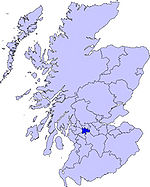Difference between revisions of "Glasgow"
Darksecretz (talk | contribs) (Reverted edits by ElaineSpain-76 (talk) to last revision by MugginsinSussex-488) Tag: Rollback |
Darksecretz (talk | contribs) |
||
| Line 4: | Line 4: | ||
__TOC__ | __TOC__ | ||
| + | The present site of Glasgow has been used since prehistoric times for settlement due to it being the forded point of the River Clyde furthest downstream, which also provided a natural area for salmon fishing. The origins of Glasgow as an established city derive ultimately from its medieval position as Scotland's second largest bishopric. Glasgow increased in importance during the 10th and 11th centuries as the site of this bishopric, reorganised by King David I of Scotland and John, Bishop of Glasgow. There had been an earlier religious site established by Saint Mungo in the 6th century. The bishopric became one of the largest and wealthiest in the Kingdom of Scotland, bringing wealth and status to the town. Between 1175 and 1178 this position was strengthened even further when Bishop Jocelin obtained for the episcopal settlement the status of burgh from King William I of Scotland, allowing the settlement to expand with the benefits of trading monopolies and other legal guarantees. Sometime between 1189 and 1195 this status was supplemented by an annual fair, which survives to this day as the Glasgow Fair. | ||
| + | Major towns: Partick, Govan | ||
| + | Industries: Shipbuilding | ||
Latest revision as of 14:58, 18 May 2023
Contents
The present site of Glasgow has been used since prehistoric times for settlement due to it being the forded point of the River Clyde furthest downstream, which also provided a natural area for salmon fishing. The origins of Glasgow as an established city derive ultimately from its medieval position as Scotland's second largest bishopric. Glasgow increased in importance during the 10th and 11th centuries as the site of this bishopric, reorganised by King David I of Scotland and John, Bishop of Glasgow. There had been an earlier religious site established by Saint Mungo in the 6th century. The bishopric became one of the largest and wealthiest in the Kingdom of Scotland, bringing wealth and status to the town. Between 1175 and 1178 this position was strengthened even further when Bishop Jocelin obtained for the episcopal settlement the status of burgh from King William I of Scotland, allowing the settlement to expand with the benefits of trading monopolies and other legal guarantees. Sometime between 1189 and 1195 this status was supplemented by an annual fair, which survives to this day as the Glasgow Fair.
Major towns: Partick, Govan Industries: Shipbuilding
Register Offices
Copy Certificates for events within Glasgow may be obtained from
Registration Office
1 Martha Street
Glasgow
G1 1JJ
Tel; 0141 287 7678
A genealogy research centre (with online birth. marriage and death records index at the venue) can prove a useful source of information;
Record Office Lookup Requests
Please read the Terms and Conditions before requesting a lookup.
By requesting a lookup you are agreeing to the Terms and Conditions as linked above.
Record Office Lookup Contacts
Cemetery Lookup Requests
Please read the Terms and Conditions before requesting a lookup.
By requesting a lookup you are agreeing to the Terms and Conditions as linked above.
Cemetery Lookup Contacts
Photo Offers
Members that have offered to take photographs in particular areas. Please private message the member with your queries.
Links
Library Links
To find address and opening times etc for the many community libraries within the Glasgow area see the Library Locations Page
For reference and genealogy research Glasgow is well served by The Mitchell Library. The following links give additional information about the library and the services available;
- Address and Travel information
- Online Catalogue
- Library Collections
- Local History at The Mitchell
- Family History at The Mitchell
- Archives and Special Collections
- Wylie & Lochhead Funeral Registers at the University of Glasgow Archives
Online Local History Research
- Virtual Mitchell
- The Glasgow Story
- The First Glasgow Directory 1787
- A Most Curious Murder, The Madeleine Smith Story
- Glasgow History
- Glasgow Digital Library Collections
- Glaswegians Photo Archive
- Southern Necropolis, Hutchesontown, Glasgow
- Clydebridge Steelworks
- Hyndland Local History
Family History Society
Back to Scotland
